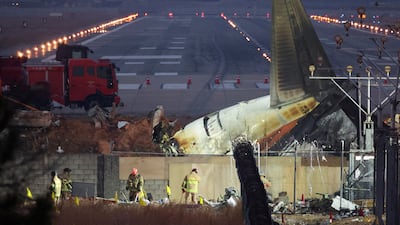The recent air crashes are unlikely to affect travel demand, aviation industry analysts have said, maintaining that air travel remains the safest form of transport.
On Sunday, a Jeju Air Boeing 737-800 crashed at Muan International Airport in Korea’s southwestern province of South Jeolla. With 179 of the 181 people on board killed, the incident has turned out to be the country's worst domestic civil aviation disaster.
Korean officials announced on Monday that they will conduct safety inspections of all Boeing 737-800 aircraft operated by domestic airlines.
Boeing’s shares fell nearly 5.1 per cent in pre-market trading on Monday before paring losses.
Shares of the US plane maker, which is still recovering from the impact of the 737 Max crisis and other safety issues with its planes, were down 3.36 per cent at $174.52 per share as of 5.15pm UAE time.
The Jeju Air crash was the second aviation disaster to occur in roughly four days.
On December 25, an Azerbaijan Airlines flight, an Embraer 190 aircraft, crashed near the city of Aktau, Kazakhstan, while en route to Russia.
Despite the incidents, analysts remain optimistic about the future of air travel.
“Air travel is still the safest way to travel in the world. You're more likely to meet an accident in a car,” said Mark Martin, chief executive of Martin Consulting, an aviation advisory and risk firm.
“But when [such incidents] happen, we need to step in to do everything possible to ensure that it does not happen again,” he told The National.
Echoing Mr Martin's comments, Saj Ahmad, chief analyst at StrategicAero Research, emphasised the exceptional safety record of air travel.
He cited a recent safety report by the International Air Transport Association (Iata), which found that aircraft accidents are extremely rare, occurring, on average, once every 880,000 flights.
“If we were to dissect numbers even further, it can be argued that air travel is significantly safer than travelling by cars, motorbike or even walking,” Mr Ahmad told The National.
He acknowledged that accidents do “frighten people, and it’s OK to be frightened”, but said that people will continue to trust air travel because it is safe and remains the best option for travelling across continents.
The commercial aviation industry recorded 30 accidents last year, down from 42 in 2022, and the accident rate dropped by roughly 40 per cent, according to Iata estimates.
Investigations continuing
The Jeju Air plane attempted a belly landing due to a suspected landing gear failure, overshot the runway, collided with a barrier and burst into flames.
Initial reports and statements from Korean officials suggest that a bird strike may have been a factor in the crash, but experts said that a bird strike alone could not have caused the incident.
“We don't know whether it had to do with the bird strike or there was something else,” Mr Martin said.
“[Normally], if you have a bird strike, you won't lose complete hydraulics … something has majorly gone wrong and that needs to be investigated, if other pilots have to be alerted.”
The Muan International Airport has also come under scrutiny, with some analysts suggesting that the airport's location may have increased the likelihood of bird strikes.
“It is located near tidal flats frequented by migratory birds, posing a known risk for aviation,” said Fahad Masood, an aviation expert and a member of the UK’s Royal Aeronautical Society.
“Implementing advanced bird management systems, such as avian radar and habitat modifications around the airport, could help minimise these risks,” he told The National.
Experts have also raised concerns about the concrete structure at the end of the runway, which the Jeju Air plane crashed into, as well as the runway's length, which, at 2,800 metres, is significantly shorter than those at major international air hubs.
Investigators are conducting a detailed analysis of the aircraft's black boxes, which record flight data and cockpit conversations.
“This process is meticulous and time-consuming but essential for uncovering the sequence of events leading to the crash,” Mr Masood said.
A tragic incident
The Azerbaijan Airlines plane was allegedly shot down by Russian air defences attempting to intercept a Ukrainian drone strike near Grozny, the capital of the Russian republic of Chechnya. It crashed in Kazakhstan, resulting in the deaths of 38 of the 67 people on board.
Preliminary findings suggest that the aircraft was struck by a Russian Pantsir-S1 air defence system. The proximity fuse of the missile is likely to have detonated near the aircraft's fuselage, causing severe damage, particularly to the hydraulic systems, Mr Masood said.
The incident has raised serious concerns about the safety of civilian aircraft operating in conflict zones.
“The flight was not officially in a no-fly zone, but it was flying through an area with heightened military activity,” he said.
“This situation underscores the need for better co-ordination and communication regarding airspace safety, especially in conflict zones.”
Azerbaijan blamed Russia for accidentally shooting down the plane. While Moscow initially denied responsibility, President Vladimir Putin on Saturday apologised for the “tragic incident”.
In 2014, Malaysia Airlines flight MH17 was brought down over eastern Ukraine by a missile launched from territory controlled by Russian-backed separatists.

